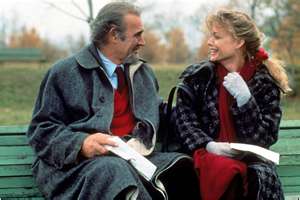 Desde que la vi por primera vez, poco después de su estreno, en el año 91, sentí una inmediata fascinación por La Casa Rusia; una fascinación que, con el tiempo, se ha convertido en debilidad. He de admitir que, por aquel entonces, el atractivo físico que sentía por Michelle Pfeiffer casi me cortaba el aliento, de modo que es muy probable que mi incondicional adhesión a la película estuviese muy relacionada con este hecho; sin embargo, por supuesto, no era sólo eso. Hay algo en las buenas producciones que trasciende, de algún modo, a sus actores y que deja un poso de belleza en cualquier espíritu sensible; y La Casa Rusia tiene, desde luego, ese algo. Conste que no estoy diciendo que ahora ya no me sienta atraído por la Pfeiffer de entonces, sino que la película tiene bastantes más virtudes.
Desde que la vi por primera vez, poco después de su estreno, en el año 91, sentí una inmediata fascinación por La Casa Rusia; una fascinación que, con el tiempo, se ha convertido en debilidad. He de admitir que, por aquel entonces, el atractivo físico que sentía por Michelle Pfeiffer casi me cortaba el aliento, de modo que es muy probable que mi incondicional adhesión a la película estuviese muy relacionada con este hecho; sin embargo, por supuesto, no era sólo eso. Hay algo en las buenas producciones que trasciende, de algún modo, a sus actores y que deja un poso de belleza en cualquier espíritu sensible; y La Casa Rusia tiene, desde luego, ese algo. Conste que no estoy diciendo que ahora ya no me sienta atraído por la Pfeiffer de entonces, sino que la película tiene bastantes más virtudes.
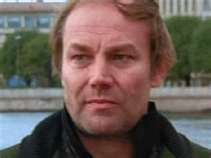 Desde aquel lejano día –veinte años largos ya– he tenido ocasión de verla varias veces más, tanto en su versión original como doblada, y nunca me ha defraudado. Creo, de hecho, que podría seguir viéndola esporádicamente hasta el fin de mis días sin arrepentirme nunca del rato invertido. Pero ¿qué es lo que tiene de tan especial para mí? No lo sé bien. Tal vez sea porque reúne buena parte de los valores que yo más aprecio. Es una historia de amor y de amistad, de fidelidades e idealismos; una historia que denuncia la mentira de los gobiernos, el sofisma de nuestras sociedades, y los enfrenta a las vidas de cada ciudadano. Transcurre, por otra parte, en dos de las ciudades que más me han asombrado a lo largo de mis viajes: San Petersburgo y Lisboa, representantes de los mundos luso y eslavo, espiritualmente tan similares. Además, a pesar de ser una ficción de espionaje, no resulta incomprensible: es fácil de seguir. Los diálogos son buenos, a veces brillantes, pero sin llegar a resultar inverosímiles. La fotografía es muy bonita, sin llegar a ostentosa; bella, mas sin distraer la atención del espectador. La interpretación de los actores quizá no es magnífica, pero sí, en cierto sentido, impecable.
Desde aquel lejano día –veinte años largos ya– he tenido ocasión de verla varias veces más, tanto en su versión original como doblada, y nunca me ha defraudado. Creo, de hecho, que podría seguir viéndola esporádicamente hasta el fin de mis días sin arrepentirme nunca del rato invertido. Pero ¿qué es lo que tiene de tan especial para mí? No lo sé bien. Tal vez sea porque reúne buena parte de los valores que yo más aprecio. Es una historia de amor y de amistad, de fidelidades e idealismos; una historia que denuncia la mentira de los gobiernos, el sofisma de nuestras sociedades, y los enfrenta a las vidas de cada ciudadano. Transcurre, por otra parte, en dos de las ciudades que más me han asombrado a lo largo de mis viajes: San Petersburgo y Lisboa, representantes de los mundos luso y eslavo, espiritualmente tan similares. Además, a pesar de ser una ficción de espionaje, no resulta incomprensible: es fácil de seguir. Los diálogos son buenos, a veces brillantes, pero sin llegar a resultar inverosímiles. La fotografía es muy bonita, sin llegar a ostentosa; bella, mas sin distraer la atención del espectador. La interpretación de los actores quizá no es magnífica, pero sí, en cierto sentido, impecable.
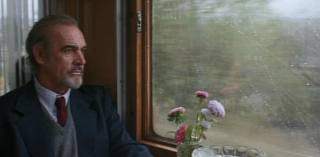 Sin embargo, eso no es todo. Hay algo que ha estado ahí siempre, condicionando mi experiencia de verla, contribuyendo a complacerme, pero escondido; algo que sólo hoy creo haber descubierto. Y es que La Casa Rusia me resulta muy agradable de ver, me produce una especie de paz espiritual, porque en ella, a pesar de situarse durante la guerra fría, en un mundo de países enfrentados y potencias hostiles, ninguno de los personajes se me hace antipático. Todos resultan cálidos; todos están tratados desde un punto de vista muy humano, con todos soy capaz de identificarme. Dejando a un lado, obviamente, a los dos protagonistas, me hipnotiza la fuerza dramática del heroísmo de Dante, me conmueve la honestidad profesional de Russel, me cautiva el sentimentalismo de Ned y, en general, tanto los de un bando como los de otro se nos muestran desde un lado –como digo– humano; sin que por ello sea una de esas pretenciosas creaciones donde, a fuerza de querer ser objetivas, “no hay buenos ni malos”, sino más bien una donde sólo se nos muestra el lado bueno de cada personaje; enfoque que me parece mucho más honesto.
Sin embargo, eso no es todo. Hay algo que ha estado ahí siempre, condicionando mi experiencia de verla, contribuyendo a complacerme, pero escondido; algo que sólo hoy creo haber descubierto. Y es que La Casa Rusia me resulta muy agradable de ver, me produce una especie de paz espiritual, porque en ella, a pesar de situarse durante la guerra fría, en un mundo de países enfrentados y potencias hostiles, ninguno de los personajes se me hace antipático. Todos resultan cálidos; todos están tratados desde un punto de vista muy humano, con todos soy capaz de identificarme. Dejando a un lado, obviamente, a los dos protagonistas, me hipnotiza la fuerza dramática del heroísmo de Dante, me conmueve la honestidad profesional de Russel, me cautiva el sentimentalismo de Ned y, en general, tanto los de un bando como los de otro se nos muestran desde un lado –como digo– humano; sin que por ello sea una de esas pretenciosas creaciones donde, a fuerza de querer ser objetivas, “no hay buenos ni malos”, sino más bien una donde sólo se nos muestra el lado bueno de cada personaje; enfoque que me parece mucho más honesto.
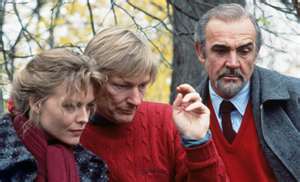 La Casa Rusia es en fin, para mí, un clásico. Una película equilibrada y redonda.
La Casa Rusia es en fin, para mí, un clásico. Una película equilibrada y redonda.
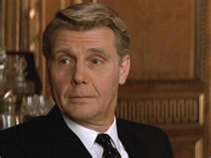
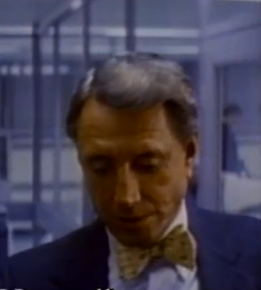 .
.
 Since I first watched it in the year 91, soon after its premiere, I felt an immediate fascination for The Russia House; a fascination that, in time, has become a weakness. I have to admit that, by then, I was so physically attracted to Michelle Pfeiffer that she almost left me breathless, therefore this fact was very likely related to my unwavering adherence to the movie. However, there wasn’t just that. Good films have something that goes beyond their actors and leaves a remainder of beauty in any sensitive soul; and The Russia House surely has that something. Mark: I don’t mean that now I’m not any more attracted to the Pfeiffer who was then, but that this movie offers me much more.
Since I first watched it in the year 91, soon after its premiere, I felt an immediate fascination for The Russia House; a fascination that, in time, has become a weakness. I have to admit that, by then, I was so physically attracted to Michelle Pfeiffer that she almost left me breathless, therefore this fact was very likely related to my unwavering adherence to the movie. However, there wasn’t just that. Good films have something that goes beyond their actors and leaves a remainder of beauty in any sensitive soul; and The Russia House surely has that something. Mark: I don’t mean that now I’m not any more attracted to the Pfeiffer who was then, but that this movie offers me much more.
 Since that distant day–more than twenty years off now–I’ve watched it several times, and I haven’t once felt disappointed. Actually, I believe I could keep watching it every other year till the end of my days and I’d always enjoy it. But… what is so special about it? I’m not sure; I’d say that this production aggregates a good deal of those values that I most appreciate. The Russia House is a story about love and friendship, allegiance and idealism; facing our governments’ lies, our societies’ sophisms, to the particular citizens’ lives. Besides, it takes place in two of my favourite cities that I’ve known during my trips, Lisbon and St. Petersburg, portraying Portuguese and Slavic souls, actually so alike. On the other hand, despite being a spy movie, it’s not altogether unfatomable; it’s even easy to follow. Dialogues are good, some of them brilliant, while still plausible. Photography is quite fine, without baffling the spectator’s attention. The interpretation might not be worth an oscar, but it’s, so to say, flawless.
Since that distant day–more than twenty years off now–I’ve watched it several times, and I haven’t once felt disappointed. Actually, I believe I could keep watching it every other year till the end of my days and I’d always enjoy it. But… what is so special about it? I’m not sure; I’d say that this production aggregates a good deal of those values that I most appreciate. The Russia House is a story about love and friendship, allegiance and idealism; facing our governments’ lies, our societies’ sophisms, to the particular citizens’ lives. Besides, it takes place in two of my favourite cities that I’ve known during my trips, Lisbon and St. Petersburg, portraying Portuguese and Slavic souls, actually so alike. On the other hand, despite being a spy movie, it’s not altogether unfatomable; it’s even easy to follow. Dialogues are good, some of them brilliant, while still plausible. Photography is quite fine, without baffling the spectator’s attention. The interpretation might not be worth an oscar, but it’s, so to say, flawless.
 Yet, there’s something else. Something that has always been there, adding to the experience, pleasing me, hidden, which I believe I haven’t noticed but now. Indeed, I find The Russia House so nice to watch, so heart-soothing, because, despite taking place during the cold war, in a world of conflicting powers and hostile countries, none of the characters is unpleasant, at least to my eyes. All of them are nice, in a way or other; all regarded from such a human point of view, which I can identify myself with. Leaving aside, obviously, the two main stars, the dramatic strength of Dante’s heroism mesmerizes me, Russel’s professional integrity moves me, Ned’s sentimentalism captures me and, in general, all of them, no matter which side, are viewed from a kind, warm angle; notwithstanding, it’s not one of those pretentious movies, presumedly objective, where “there are no good nor bad guys”; rather a film where only the good side of every character is shown; which I consider a more honest approach. And this is, maybe, one of its features that I like the best.
Yet, there’s something else. Something that has always been there, adding to the experience, pleasing me, hidden, which I believe I haven’t noticed but now. Indeed, I find The Russia House so nice to watch, so heart-soothing, because, despite taking place during the cold war, in a world of conflicting powers and hostile countries, none of the characters is unpleasant, at least to my eyes. All of them are nice, in a way or other; all regarded from such a human point of view, which I can identify myself with. Leaving aside, obviously, the two main stars, the dramatic strength of Dante’s heroism mesmerizes me, Russel’s professional integrity moves me, Ned’s sentimentalism captures me and, in general, all of them, no matter which side, are viewed from a kind, warm angle; notwithstanding, it’s not one of those pretentious movies, presumedly objective, where “there are no good nor bad guys”; rather a film where only the good side of every character is shown; which I consider a more honest approach. And this is, maybe, one of its features that I like the best.  In short, The Russia House is for me a classic, a must. A balanced and accomplished movie.
In short, The Russia House is for me a classic, a must. A balanced and accomplished movie.

 .
.
